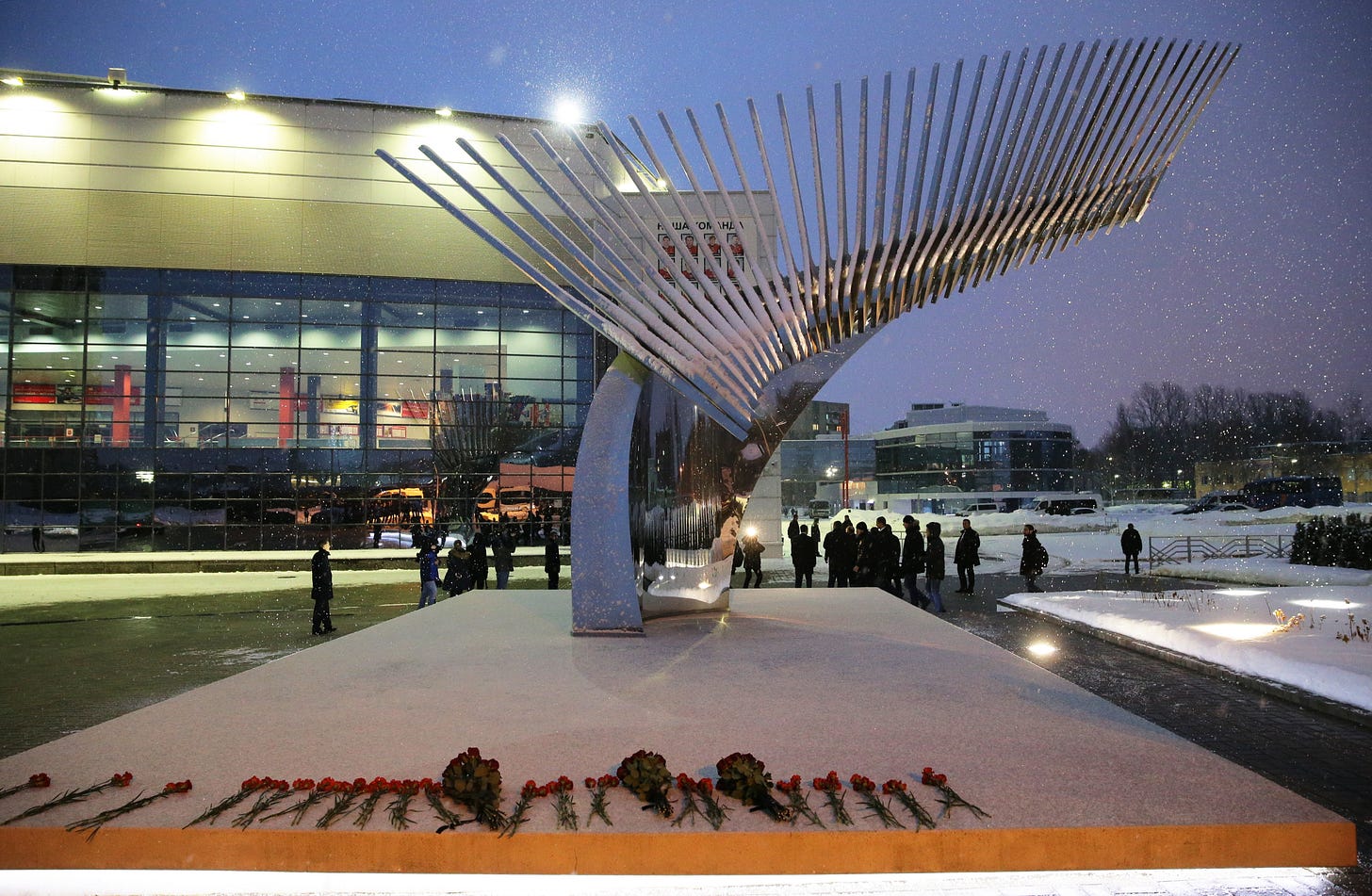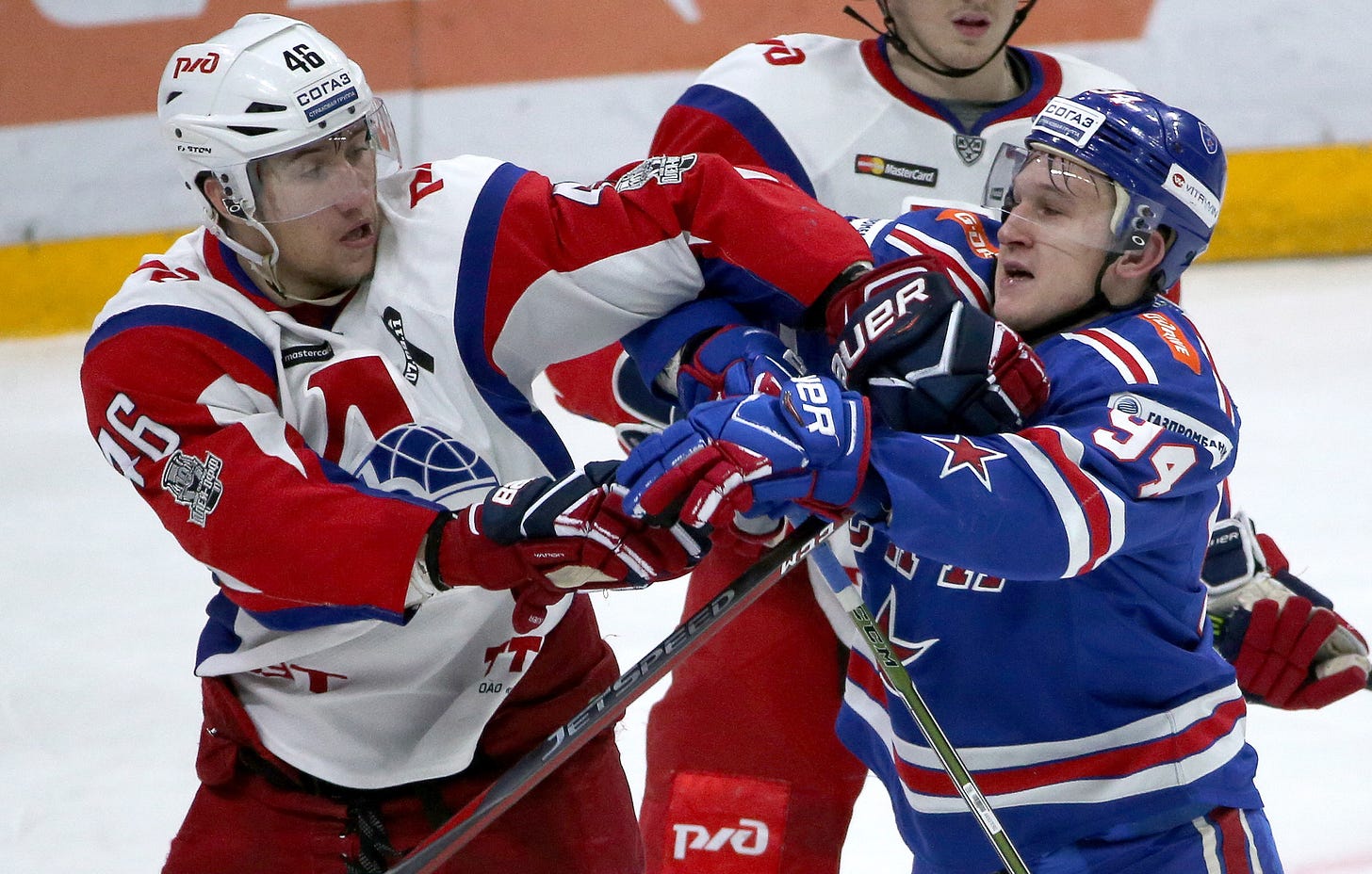Yaroslavl tragedy touched entire hockey world, including former, current Coyotes
The plane crash that killed the Lokomotiv KHL team occurred 10 years ago today
Welcome to the AZ Coyotes Insider newsletter. I generally publish stories four to six times per week. By subscribing, you’ll be supporting independent, accountable journalism. Subscribe now so you won’t miss a story.

Ilya Lyubushkin had just come off the ice from a morning skate with Metallurg Novokuznetsk’s MHL team, Kuznetskie Medvedi, when he saw the news on the locker room’s TV. Yak-Service charter flight 9633, which was carrying Yaroslavl Lokomotiv KHL’s team, had crashed shortly after takeoff on its way to the 2011-12 season opener in Minsk.
The Medvedi players stood silent, mouths agape. Forty-four of the 45 people onboard died as a result of the crash.
“Everyone was in shock,” Lyubushkin said.
Lyubushkin didn’t know much about Yaroslavl at the time. He was born in Moscow and had played his youth hockey in the area before moving to Novokuznetsk. Within that year, however, the Coyotes defenseman found out a lot more about the blue-collar city 272 kilometers northeast of Moscow. It became his new home.
In order to repopulate Lokomotiv’s roster, KHL president Alexander Medvedev mandated a disaster draft. Every other KHL team made three players available to create a pool of players from which Lokomotiv could select its roster to play in the VHL for one season before returning to the KHL. Lyubushkin was one of the players selected.
“When I arrived in Yaroslavl, I lived on the base of the team,” Lyubushkin said. “It was a sad time for the city and the people because every inhabitant of the city was a fan of Lokomotiv.
“Almost every car had stickers with the date and memory of the tragedy. It was difficult to put on the jersey of the team because you immediately remembered what happened. Coaches and players tried not to talk about it, but it was necessary to play for the city, for the fans, and for those guys who died in the plane crash.”

Today, on the 10-year commemoration of that tragedy, residents of Yaroslavl still honor the victims, but the impact of that crash and its 44 victims (only the flight’s mechanic survived) reached far beyond Russia’s 26th largest city. It touched the entire hockey world. Many of Yaroslavl’s players and staff had NHL connections, including connections to the Coyotes.
Former Coyote Keith Tkachuk lost good friend and former St. Louis Blues teammate Pavol Demitra. Former Coyotes assistant coach Dave King spent two years coaching in Russia before joining Dave Tippett’s Arizona staff in 2009. King lost several friends and associates including Yaroslavl assistant coach Igor Korolev, who had been King’s assistant coach with Metallurg Magnitogorsk.
Former Coyotes coach Rick Tocchet lost good friend and former Philadelphia Flyers teammate Brad McCrimmon, who was in his first year as Lokomotiv’s head coach after leaving the Detroit Red Wings bench where he had been an assistant coach for three years.
“When he was leaving Detroit, he even asked if I wanted to come over and help out,” said Tocchet, who had just lost his job as the head coach of the Tampa Bay Lightning the previous season when new owner Jeff Vinik took over. “If Brad had called me and said, ‘Listen, I really need your help,’ I would have been out there. I wouldn’t have done it for many guys, but for Brad McCrimmon, absolutely.”
McCrimmon was in his sixth NHL season when Tocchet joined the Flyers as a rookie in 1984. Tocchet ended up living in McCrimmon’s house during his second NHL season, while learning how to be a pro.
“He was a neat freak,” Tocchet said, laughing. “Everything was supposed to be in a certain place.
“I would go grocery shopping and I used to put bananas on the top of one of those freestanding microwave ovens. He comes up to me and says, ‘Why’d you put the fucking bananas up there? Put them away.’”
McCrimmon taught Tocchet more valuable lessons, too.
“We went out one night and I remember we got home at two in the morning,” Tocchet said. “We were supposed to have our five-mile run the next day, but I figured we weren’t going to do that. So at 6:30 in the morning, he knocks on my door. He goes, ‘Hey, we'll leave in 15 minutes.’ I go ‘Where?’ He goes, ‘For the five-mile run.’ I said, ‘Let's just do it later.’
“He goes, ‘Get your ass out of bed and put your shorts on. We're leaving in 15 minutes.’ He's the veteran, so I’ll tell you what, we ran the five miles. This guy made me run it on three, four hours of sleep and too many beers, but we finished. It was a great lesson on commitment.”

King played for McCrimmon’s father, Byron, in Saskatchewan, and Brad used to skate with the team as a teenager. Before taking the job in Yaroslavl, McCrimmon called King to seek his advice and gather intel on the KHL, including a keen interest in the travel arrangements.
“That was one of the saddest things for me to remember,” King said. “He had some concerns because he had talked to players that said that the travel wasn't great and there had been some issues.”
On the day of the crash, King got a call from a Russian journalist who knew he had coached there.
“It was an interesting day because on that particular day, almost all of the republics in Russia had delegates coming to Yaroslavl for party meetings and (then prime minister Vladimir) Putin was also coming in,” King said. “It was coincidental, but it made the whole thing really hit the whole country hard.”
In its second season back in the KHL, Lokomotiv was out of the playoff picture late in the season when King got a call from a Russian agent asking if he’d be willing to “parachute quickly into Yaroslavl and take over the team and try to push them into the playoffs.”
King did and Lokomotiv not only made the playoffs, it advanced to the 2014 conference final. The team had already hired a coach for the next season so King thought he was finished, but he was called back for another season and again led Lokomotiv to the playoffs.
“When that happened the city came alive again,” King said. “I had so many people come up to us during the playoffs and they didn’t say, ‘Congratulations.’ They said, ‘Thank you.’ It helped everybody to cope with it and heal.”
King said the tragedy hit Yaroslavl at its core. The city is known for having one of, if not best development program in the KHL. Many of the team’s KHL players were actually born in Yaroslavl.
“The first thing you notice when you got to the arena is on both sides, they have these large orange murals that are permanent with pictures of every player in their uniforms,” King said. “All the staff are on both sides of the arena, and they'll never come out. They're there forever.
“And then you go to the front of the building and there's what looks like a bird. It’s this great big statue with 37 steel or aluminum hockey sticks that looks like a bird or plane in flight, and there's an eternal flame at the base of this statue that burns day and day and night, 365 days a year; it will never go out.
“It is unbelievable how this event has stayed so current through the years. They say time heals all wounds, but in that particular city it has taken a lot longer. Every year, they have a big ceremony and when you think about it, because of the way that team develops its own players, just about everybody in that city would know somebody who died in the crash.”
When the Coyotes traded Tkachuk to the Blues in 2001, the trade included two of Demitra’s teammates, countrymen and friends, Michael Handzuš and Ladislav Nagy, who went to Arizona in the deal. Demitra was injured when the trade occurred.
“He didn’t talk to me much at first because I think he was pissed off and I don’t blame him because it’s never easy to lose teammates,” Tkachuk said, laughing. “Once he got back into the lineup and we started playing together, we just clicked. After that, we never left each other’s side.
“I used to laugh at him because he had been in North America for so long and he still couldn’t speak English. Everything was plural. Instead of Walt, it was Walts, but he had exceptional skill. He was a great player. There is no question that he still should have been in the NHL at the time of the crash.”
Lyubushkin just arrived in Arizona last week to begin preparing for Coyotes training camp, but on this day, his heart is back in Yaroslavl.
“Every year on this day, almost every fan comes to the place where the team crashed and brings flowers,” Lyubushkin said. “And at the minute when the crash happened, all the cars in the city make a long beep in memory of the guys.”
“Yaroslavl is a beautiful and historical city with kind people and a great team, but this day in the city is a day of mourning.”
Tkachuk can’t believe it has been 10 years since he lost his friend. And 10 years later, it still strikes how many more losses the hockey community endured.
“There's some European guys that I played with who played with those guys, and then Brad McCrimmon is a North American, Igor Korolev played in St. Louis and played around the league like some of those guys, so the circle gets bigger and bigger,” Tkachuk said. “You’re just heartbroken because you can only imagine what your own family would go through with something like that and then, what their families are going through. It’s a sad day overall, but especially for everybody in hockey and the sport itself.”





